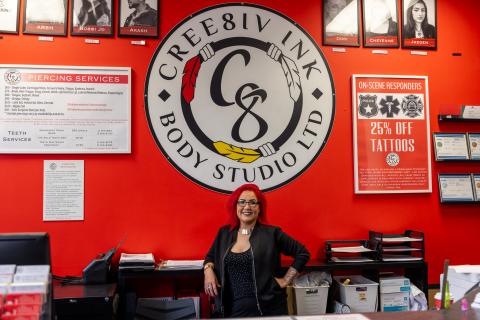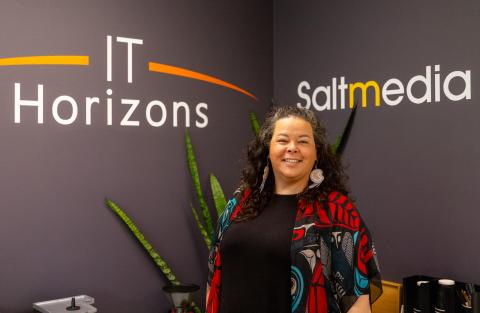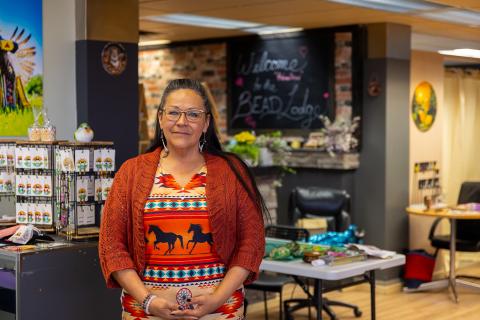A generation of Indigenous entrepreneurs are building more than businesses. They're carving out space. Spaces that reflect their communities. Spaces that honour their ancestors. Spaces that challenge colonial frameworks and offer something far more enduring - self-determination, rooted in tradition, guided by culture and driven by vision.
Bobbi Jo, Angie Saltman, and Fran Rogers are not only creating economic opportunity, they are redefining what success looks like in Grande Prairie.
These three women operate in different industries, but their stories are interwoven through a shared commitment to relational business and regional representation. Together, they are reshaping Grande Prairie’s economic future from the inside out.
Bobbi Jo – Ink, Education and a Reclaimed Narrative
Bobbi Jo is the founder of Cree8iv Ink, a longstanding tattoo studio in Grande Prairie that stands out for both its collaborative structure and national firsts. After launching in 2015, Cree8iv Ink quickly became a trusted space for both clients and artists—a multi-artist shop at a time when many were transitioning to solo practice.

“I never wanted to just be a tattoo artist,” Bobbi Jo says. “I wanted to be a mentor. I wanted to build something that gave others a way in.”
In 2019, she achieved something unprecedented: she opened the first licensed tattoo and piercing school in Canada. Today, her program combines hands-on technical training with ethical education, setting a new standard for the industry—one that recognizes safety, consent, and creativity as inseparable.
Her values are visible, even in the colours she’s chosen for her brand. The space is designed around the four colours of the medicine wheel: red for the tattoo studio—bold and passionate; yellow for the school—bright and encouraging; black for grounding and strength; white for connection. These choices are more than aesthetic—they are acts of reclamation.
“This is about wholeness,” she explains. “You can't just bring your technical skills into a space. You bring your story. Your community. Your ancestors.”
Bobbi Jo’s work goes beyond the technical. She is carving out cultural and professional space for artists, clients, and future entrepreneurs—many of whom, like herself, never saw themselves reflected in mainstream business models.
Angie Saltman – Building Technology with a Heartbeat
At first glance, Saltmedia and IT Horizons might seem like conventional tech companies offering web design, IT services, and consulting across Alberta and beyond. But behind the scenes is a business philosophy rooted in relational ethics, Indigenous principles, and a quiet revolution in how tech is delivered.
Angie Saltman is the president of Saltmedia and co-owner of IT Horizons, two businesses she co-founded with her partner and husband. With a background in technology, an MBA in Indigenous Business and Economies, and years of lived experience navigating systems not built for her, Angie is on a mission to build something different.

“Too often, the world of tech treats people as transactions. But business is human,” she says. “We are emotional. We are physical. We are spiritual. And yes, we are digital too. The medicine wheel reminds me of that every day—it’s a model for how I lead.”
Under Angie’s leadership, Saltmedia has grown from a home-based business to a nationally respected agency that works with post-secondary institutions, governments, and Indigenous organizations. Her team integrates Indigenous values into client projects—from visual storytelling to digital accessibility—and has done so without ever losing its sense of cultural accountability.
Perhaps one of Angie’s most notable contributions is her advocacy work in uplifting the Indigenous economy. She founded the Indigenous Business Mixer in Grande Prairie to create more visible, tangible space for Indigenous entrepreneurs to connect, collaborate and thrive.
“We’re not just participating in the economy,” she says. “We’re building it.”
Fran Rogers – Culture, Craft and Community Connection
Walk into The Bead Lodge and you’ll immediately feel it is more than a store. This is a place of presence, of stories, of belonging. Founded by Fran Rogers, The Bead Lodge is part bead store, part gathering place, part quiet revolution.
Before opening a storefront in 2025, Fran was selling beadwork from her home and vending at powwows and conferences across the region. But the need for a dedicated, authentic Indigenous retail space in Grande Prairie became too loud to ignore.

“Why should we have to drive to Edmonton for beads?” she asks. “Why should we pay for knockoffs made overseas when our own artists are here?”
The Bead Lodge is built on regionality and representation. It reflects the cultural identity of the Cree, Dene, and Métis peoples of the Peace Region. It features local beadwork, regalia, and art that honours the distinct traditions of the North. Inside, every photo on the wall features real family and community members. Every item for sale is crafted by someone who lives in the region.
The space includes the design for the Four Directions Coffeehouse—an in-store gathering space designed to invite connection through crafting, conversation, and cultural sharing. Weekly beading circles are open to everyone, especially those seeking reconnection after displacement or loss.
“We’ve got so many urban Indigenous people here who are trying to find their way back to culture,” Fran says. “Coming for coffee is a safe place to start.”
She chose the word lodge intentionally.
“A lodge is a place where sacred things happen. Where people feel safe. That’s what we’re building here. Not just a store, but a system. Our system.”
Weaving It Together: Land, Legacy and the Local Economy
Together, Bobbi Jo, Angie and Fran represent more than three successful businesses. Each of them reclaiming space in their own way.
Their work challenges traditional notions of success. It shows that economic participation is not simply about revenue or expansion. It is about creating systems that align with identity, tradition, and community well-being. It is about carving out room for Indigenous perspectives in an economy that often overlooks them.
Grande Prairie has long been known for its work ethic and opportunity. What they are doing now speaks to something deeper. This is a community where tradition and innovation meet, where Indigenous identity is not added after the fact, but built into the foundation. It is a place where people are not waiting to be included, but leading.
This is not just economic growth. It is a shift in how we define prosperity.
